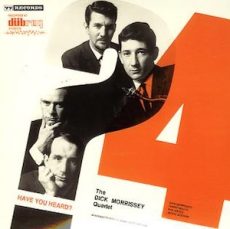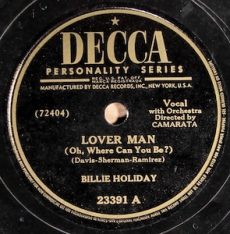
Daily Dose Of Jazz…
Billy Novick was born on Long Island, New York on October 12, 1951 and began playing clarinet at age eight. He picked up the saxophone at fifteen, and began playing club dates and concerts around the New York area. By 1973 he joined the David Bromberg band. After leaving the band, he started touring and making regional appearances as a sideman with a series of pop performers, including Leon Redbone, Jonathan Edwards, and Martha and the Vandellas.
While rehearsing for a dance performance in 1976, Novick was introduced to the innovative guitarist Guy Van Duser, and the two began a collaboration that continues to flourish. He joined the New Black Eagle Jazz Band, and continues to perform with them. He has appeared on more than thirty-five of the band’s recordings.
With jazz as his first love, Billy has always had an eclectic sensibility and enjoys being able to play a wide range of musical styles. He has performed with blues greats Robert Junior Lockwood, Willie Dixon, Ruth Brown, Duke Robillard, Scott Hamilton, Milt Hinton, Herb Pomeroy, Dave McKenna, Dorothy Donegan and Butch Thompson. He has recorded with a wide variety of artists including Maria Muldaur, Tex-Mex star Freddy Fender, Celtic performers Robbie O’Connel and Aine Minogue, and even rock legend J. Geils.
Internationally recognized as a musician, performer, arranger and composer, he has toured extensively throughout North America, Europe and Asia, and has made spotlight appearances at numerous festivals.
Clarinetist Billy Novick, who has been featured as a sideman on over two hundred and fifty recordings and as a composer, arranger or studio musician has appeared in more than 100 film scores, television shows and commercials, continues to compose, arrange, perform and record.
More Posts: clarinet,history,instrumental,jazz,music

Daily Dose Of Jazz…
Paolo Ricca was born on October 2, 1963 in Turin, Italy and began studying classical piano at an early age. After school, he continued his studies and expanded into the realm of jazz performance and composition at CPM Music Institute in Milan, Italy where he graduated, under the tutelage of Franco D’Andrea.
The early 1980’s saw the beginning of his professional career performing for live audiences. A few years later Paolo performed in over 3000 concerts and festivals all over Europe, while simultaneously building a solid reputation as a studio musician. He has collaborated with John Etheridge, Soft Machine, Stèphane Grappelli, John Williams, Lee Brown, La Verne Jackson, Mokhtar Samba ( Joe Zawinul’s Sindycate, Jaco Pastorius, Carlos Santana, M. Orza, Dee D. Jackson, Haddaway and many others.
He ventured into music technology, computers, sequencers, looping, and sampling. Ricca began studio work with engineering, recording, as well as arranging and composing. He has worked for major recording companies, producing music on both a national and an international level.
Pianist Paolo Ricca, whose 2023 release, My Italian Piano Songbook, won First Prize for Best CD at the prestigious Swiss International Music Competition, continues to perform, tour and record as a leading voice in contemporary international piano music.
More Posts: arranger,bandleader,history,instrumental,jazz,music,piano

Daily Dose Of Jazz…
Doug Beavers was born September 22, 1976 in Bellflower, California. He received a BA in music from California State University, East Bay, an MA in composition from the Manhattan School of Music. He is the founder of the music production company and record label, Circle 9.
As a performer Doug has worked with Eddie Palmieri, Spanish Harlem Orchestra, Mingus Big Band, Christian McBride, Paul Simon, and others. He also served as an adjunct professor at Los Medanos College and music faculty of Jazz Trombone at California State University, East Bay.
His most recent album recording,Sol, was released in 2020. In 2021, he received a New Jazz Works grant from Chamber Music America. Trombonist, arranger, composer and producer Doug Beavers, a Grammy Award-winning musician, is currently an adjunct faculty member at the College of New Jersey.
More Posts: arranger,bandleader,composer,history,instrumental,jazz,music,producer,trombone

Daily Dose Of Jazz…
Harry Percy South was born on September 7, 1929 in Fulham, London, England. He came to prominence in the 1950s, playing with Joe Harriott, Dizzy Reece, Tony Crombie, and Tubby Hayes. In 1954, he was in the Tony Crombie Orchestra with Dizzy Reece, Les Condon, Joe Temperley, Sammy Walker, Lennie Dawes, and Ashley Kozak.
Returning from a Calcutta, India tour with the Ashley Kozak Quartet, he spent four years with the Dick Morrissey Quartet, where he both wrote and arranged material for their subsequent four albums. He formed the Harry South Big Band in 1966 with Latin, ballads and straight-forward swingers.
By the mid-1960s, he began working with British rhythm & blues singer and organist Georgie Fame, recording the album Sound Venture. He composed and arranged for Humphrey Lyttelton, Buddy Rich, Sarah Vaughan, and Jimmy Witherspoon and was musical director and arranger for Annie Ross.
He branched out into session work, writing themes for television and music libraries. He is credited with the arrangements used for Emerson, Lake & Palmer’s Works Vol. 1 (1977). In 1981, he again arranged for Annie Ross and Georgie Fame in a collaboration on what was to be Hoagy Carmichael’s last recording, In Hoagland.
Pianist, composer and arranger Harry South, who was honored with an album released by the National Youth Jazz Orchestra, died on March 12, 1990 in Lambeth, London at the age of 60.
More Posts: arranger,composer,history,instrumental,jazz,music,piano

Daily Dose Of Jazz…
James Benjamin Sherman was born on August 17, 1908 in Williamsport, Pennsylvania. He played piano in dance bands in the late 1920s and played on and off with Jimmy Gorham in the metropolitan Philadelphia area. In 1930 he began playing on a steamboat in Alphonso Trent’s band, then played in the 1930s with Peanuts Holland, Al Sears, Stuff Smith, Lil Armstrong, Putney Dandridge, Mildred Bailey, and Billie Holiday.
From the mid- to late ’30s Jimmy played in various swing groups but is best known for his hand in composing the jazz standard Lover Man, co-written with Jimmy Davis and Roger Ramirez, and was first recorded by Billie Holiday
He became the pianist and arranger for The Charioteers in 1938, remaining with the group until 1952. Following this he played primarily locally in eastern Pennsylvania. In 1960 he took up a residency at Miss Jeanne’s Crossroad Tavern in Chester County, Pennsylvania, where he played until shortly before his death.
Pianist and arranger Jimmy Sherman died on October 11, 1975 in Philadelphia, Pennsylvania.
More Posts: arranger,bandleader,composer,history,instrumental,jazz,music,piano




